2019-2020 学年高三下学期6月冲刺英语试卷(新高考卷)(浙江版)
- 格式:doc
- 大小:106.00 KB
- 文档页数:15
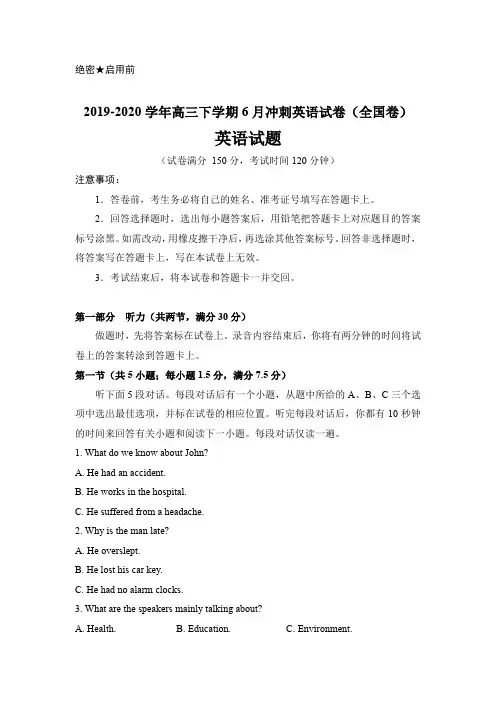
绝密★启用前2019-2020学年高三下学期6月冲刺英语试卷(全国卷)英语试题(试卷满分150分,考试时间120分钟)注意事项:1.答卷前,考生务必将自己的姓名、准考证号填写在答题卡上。
2.回答选择题时,选出每小题答案后,用铅笔把答题卡上对应题目的答案标号涂黑。
如需改动,用橡皮擦干净后,再选涂其他答案标号。
回答非选择题时,将答案写在答题卡上,写在本试卷上无效。
3.考试结束后,将本试卷和答题卡一并交回。
第一部分听力(共两节,满分30分)做题时,先将答案标在试卷上。
录音内容结束后,你将有两分钟的时间将试卷上的答案转涂到答题卡上。
第一节(共5小题;每小题1.5分,满分7.5分)听下面5段对话。
每段对话后有一个小题,从题中所给的A、B、C三个选项中选出最佳选项,并标在试卷的相应位置。
听完每段对话后,你都有10秒钟的时间来回答有关小题和阅读下一小题。
每段对话仅读一遍。
1. What do we know about John?A. He had an accident.B. He works in the hospital.C. He suffered from a headache.2. Why is the man late?A. He overslept.B. He lost his car key.C. He had no alarm clocks.3. What are the speakers mainly talking about?A. Health.B. Education.C. Environment.4. How old is the girl?A. 6 years old.B. 9 years old.C. 15 years old.5. What’s the relationship between the speakers?A. Neighbors.B. Former classmates.C. Workmates.第二节(共15小题;每小题1.5分,满分22.5分)听下面5段对话或独白。
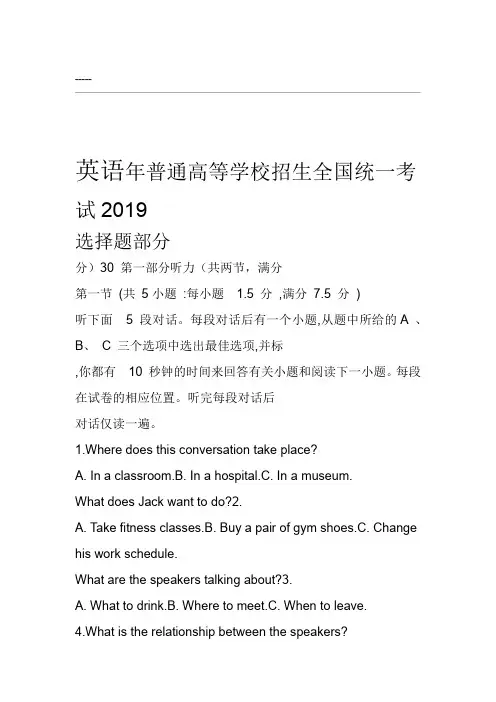
-----英语年普通高等学校招生全国统一考试2019选择题部分分)30 第一部分听力(共两节,满分第一节(共5小题:每小题 1.5 分,满分7.5 分)听下面 5 段对话。
每段对话后有一个小题,从题中所给的A 、B、C 三个选项中选出最佳选项,并标,你都有10 秒钟的时间来回答有关小题和阅读下一小题。
每段在试卷的相应位置。
听完每段对话后对话仅读一遍。
1.Where does this conversation take place?A. In a classroom.B. In a hospital.C. In a museum.What does Jack want to do?2.A. Take fitness classes.B. Buy a pair of gym shoes.C. Change his work schedule.What are the speakers talking about?3.A. What to drink.B. Where to meet.C. When to leave.4.What is the relationship between the speakers?A Colleagues.B. Classmates.C. Strangers.5.Why is Emily mentioned in the conversation?She might want a ticket. A.She is looking for the man. B.She has an extra ticket.C.第二节(共15 小题:每小题15 分,满分22.5 分)听下面 5 段对话或独白。
每段对话或独白后有几个小题,从题中所给的A 、B 、C 个选项中选出5 秒最佳选项,并标在试卷的相应位置。
听每段对话或独白前,你将有时间阅读各个小题,每小题钟;听完后,各小题将给出5 秒钟的作答时间。
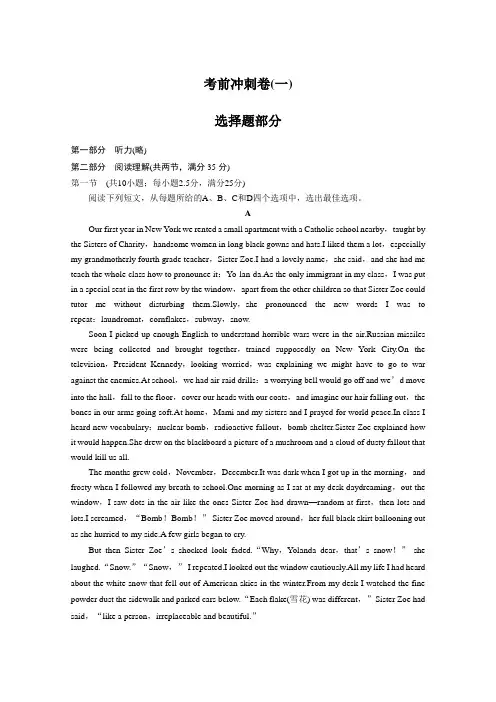
考前冲刺卷(一)选择题部分第一部分听力(略)第二部分阅读理解(共两节,满分35分)第一节(共10小题;每小题2.5分,满分25分)阅读下列短文,从每题所给的A、B、C和D四个选项中,选出最佳选项。
AOur first year in New York we rented a small apartment with a Catholic school nearby,taught by the Sisters of Charity,handsome women in long black gowns and hats.I liked them a lot,especially my grandmotherly fourth grade teacher,Sister Zoe.I had a lovely name,she said,and she had me teach the whole class how to pronounce it:Yo-lan-da.As the only immigrant in my class,I was put in a special seat in the first row by the window,apart from the other children so that Sister Zoe could tutor me without disturbing them.Slowly,she pronounced the new words I was to repeat:laundromat,cornflakes,subway,snow.Soon I picked up enough English to understand horrible wars were in the air.Russian missiles were being collected and brought together,trained supposedly on New York City.On the television,President Kennedy,looking worried,was explaining we might have to go to war against the enemies.At school,we had air-raid drills:a worrying bell would go off and we’d move into the hall,fall to the floor,cover our heads with our coats,and imagine our hair falling out,the bones in our arms going soft.At home,Mami and my sisters and I prayed for world peace.In class I heard new vocabulary:nuclear bomb,radioactive fallout,bomb shelter.Sister Zoe explained how it would happen.She drew on the blackboard a picture of a mushroom and a cloud of dusty fallout that would kill us all.The months grew cold,November,December.It was dark when I got up in the morning,and frosty when I followed my breath to school.One morning as I sat at my desk daydreaming,out the window,I saw dots in the air like the ones Sister Zoe had drawn—random at first,then lots and lots.I screamed,“Bomb!Bomb!” Sister Zoe moved around,her full black skirt ballooning out as she hurried to my side.A few girls began to cry.But then Sister Zoe’s shocked look faded.“Why,Yolanda dear,that’s snow!”she laughed.“Snow.”“Snow,” I repeated.I looked out the window cautiously.All my life I had heard about the white snow that fell out of American skies in the winter.From my desk I watched the fine powder dust the sidewalk and parked cars below.“Each flake(雪花) was different,”Sister Zoe had said,“like a person,irreplaceable and beautiful.”1.According to Paragraph 1,which of the following words can best describe Sister Zoe? A.Devoted. B.Faithful.C.Ambitious. D.Considerate.答案 D解析推理判断题。
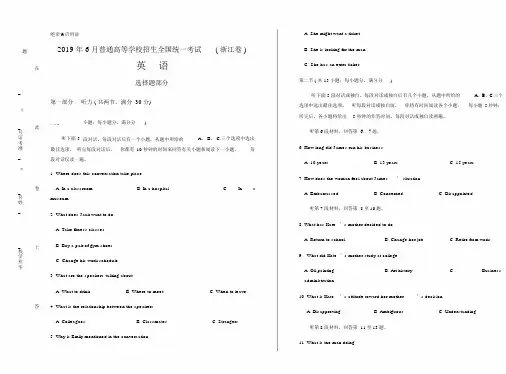
题_______ 无______号证考准_____ 效________名姓_____________校学业毕绝密★启用前2019 年 6 月普通高等学校招生全国统一考试( 浙江卷 )-------------英语在选择题部分第一部分听力 ( 共两节,满分 30 分)--------------------小题;每小题分,满分分)第一节 ( 共 5此听下面 5段对话。
每段对话后有一个小题,从题中所给的A、 B、 C三个选项中选出最佳选项。
听完每段对话后,你都有10 秒钟的时间来回答有关小题和阅读下一小题。
每段对话仅读一遍。
1.Where does this conversation take place--------------------卷 A. In a classroom. B. In a hospital. C.In amuseum.2.What does Jack want to doA. Take fitness classes.--------------------上 B. Buy a pair of gym shoes.C. Change his work schedule.3.What are the speakers talking aboutA. What to drink.B. Where to meet.C. When to leave.--------------------答 4. What is the relationship between the speakersA. Colleagues.B. Classmates.C. Strangers.5.Why is Emily mentioned in the conversation-----------------A. She might want a ticket.B. She is looking for the man.C. She has an extra ticket.第二节 ( 共 15小题;每小题分,满分分)听下面 5段对话或独白。

浙江省严州中学2019届高三6月高考考前仿真英语试题选择题部分 (共80分)注意事项:1. 答题前,考生务必将自己的姓名、准考证号用黑色字迹的签字笔或钢笔分别填写在试卷和答题纸规定的位置上。
2. 每小题选出答案后,用2B铅笔把答题纸上对应题目的答案标号涂黑。
如需改动,用橡皮擦干净后,再选涂其他答案标号。
不能答在试题卷上。
第一部分:英语知识运用(共两节,满分30分)第一节:单项填空(共20小题;每小题0. 5分,满分10分)从A、B、C和D四个选项中,选出可以填入空白处的最佳选项,并在答题纸上将该选项标号涂黑。
1. — Did your sister pass the exam?— She failed and is in low spirits.— I'm sorry for her.— ______.A. You're welcomeB. Thank youC. I would think soD. Never mind2. You are my best friend. I know I can _____ you for good advice from time to time.A. count onB. deal withC. refer toD. stand for3. By the time the traffic ______, we will have run out of gas.A. clearsB. clearedC. will clearD. has been clearing4. Ta ke action today ______ you don’t miss your windows of opportunity.A. as ifB. so thatC. now thatD. in case5. –– Tell me your secret.––I ______. It wouldn’t be a secret if I told you.A. won’tB. needn’tC. mightn’tD. couldn’t6. Even after I ______ to soil science, I sometimes wondered whether I was doing what I wantedto do.A. reactedB. switchedC. adjustedD. contributed7. Dad decided to build a small tool room with a lock, ______ he would keep his best toolsso my b rother couldn’t reach them.A. whyB. whereC. whoD. which8. ______ with the effect of the color change, the woman smiled with satisfaction.A. PleasedB. To pleaseC. To be pleasedD. Having pleased9. ______ 6 world powers have accepted ______ Iranian offer for talks on its disputed nuclearprogram.A. The; aB. 不填; anC. 不填; aD. The; an10. I have learned a lot about Asian customs, ______ in the small village for three yearsin the early 1990s.A. livedB. to liveC. having livedD. to have lived11. ______ the extreme levels of air pollution, city authorities have started to take measuresto quickly reduce pollution levels and protect city dwellers.A. In response toB. Apart fromC. In spite ofD.By means of12. –– What sort of sweets do you like?–– ______ with chocolate inside.A. ManyB. SuchC. OnesD. Each13. The use of several senses gives the brain more connections and associations, making iteasier ______ information later, which assists memory and learning.A. findB. findingC. foundD. to find14. Cloud, a search and rescue dog, was praised for her good job and was given her favorite______: beef and rice doggy biscuits.A. comfortB. treatC. hobbyD. plate15. Of all the things I have done in my professional career, nothing has been more ______than writing that book.A. approvedB. rewardingC. developedD. convincing16. The products, ______ have been recently introduced, seem to be well accepted.A. several of thoseB. several of themC. several of whomD. several of which17. Although we haven’t got the accurate statistics, it is estimated that _____ 300 factoriesin this province closed down during the economic crisis.A. partlyB. brieflyC. approximatelyD. relatively18. Chinese president Xi Jinping appeared at the Sochi Olympic opening ceremony, _____China’s strong support for the Olympics and Russia’s efforts to host the Games.A. signingB. symbolizingC. sponsoringD. signaling19. Half of the world’s population is under the age of 25 and when they are not involvedin the decision-making process, they are not aware of ______ is taking place.A. whatB. whomC. whichD. whose20. –– Fancy meeting you here.–– _______A. So you’re going.B. Tha t’s very kind of you.C. Have a nice time!D. Yes, what a coincidence!第二节:完形填空(共20小题;每小题1分,满分20分)阅读下面短文,掌握其大意,然后从21~40各题所给的四个选项(A、B、C和D)中,选出最佳选项,并在答题纸上将该选项标号涂黑。
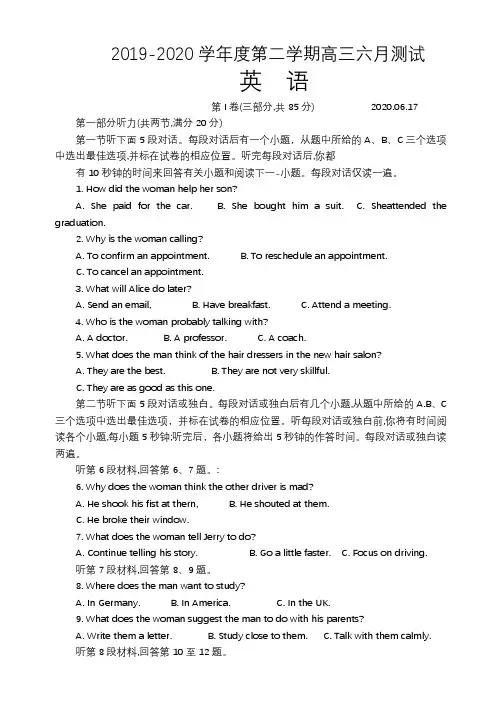
2019-2020学年度第二学期高三六月测试英语第I卷(三部分,共85分) 2020.06.17 第一部分听力(共两节,满分20分)第一节听下面5段对话。
每段对话后有一个小题,从题中所给的A、B、C三个选项中选出最佳选项,并标在试卷的相应位置。
听完每段对话后,你都有10秒钟的时间来回答有关小题和阅读下一-小题。
每段对话仅读一遍。
1. How did the woman help her son?A. She paid for the car.B. She bought him a suit.C. Sheattended the graduation.2. Why is the woman calling?A. To confirm an appointment.B. To reschedule an appointment.C. To cancel an appointment.3. What will Alice do later?A. Send an email,B. Have breakfast.C. Attend a meeting.4. Who is the woman probably talking with?A. A doctor.B. A professor.C. A coach.5. What does the man think of the hair dressers in the new hair salon?A. They are the best.B. They are not very skillful.C. They are as good as this one.第二节听下面5段对话或独白。
每段对话或独白后有几个小题,从题中所给的A.B、C 三个选项中选出最佳选项,并标在试卷的相应位置。
听每段对话或独白前,你将有时间阅读各个小题,每小题5秒钟;听完后,各小题将给出5秒钟的作答时间。
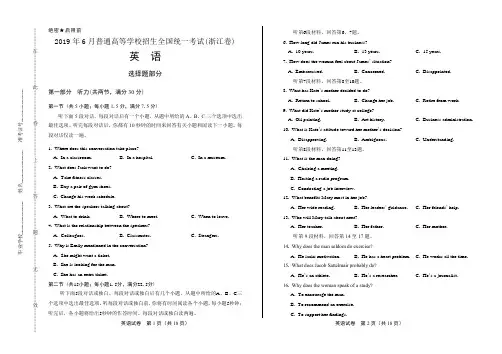
英语试卷 第1页(共18页)英语试卷 第2页(共18页)绝密★启用前2019年6月普通高等学校招生全国统一考试(浙江卷)英 语选择题部分第一部分 听力(共两节,满分30分)第一节 (共5小题;每小题1.5分,满分7.5分)听下面5段对话。
每段对话后有一个小题,从题中所给的A 、B 、C 三个选项中选出最佳选项。
听完每段对话后,你都有10秒钟的时间来回答有关小题和阅读下一小题。
每段对话仅读一遍。
1. Where does this conversation take place? A . In a classroom .B . In a hospital .C . In a museum .2. What does Jack want to do? A . Take fitness classes . B . Buy a pair of gym shoes . C . Change his work schedule .3. What are the speakers talking about? A . What to drink .B . Where to meet .C . When to leave .4. What is the relationship between the speakers? A . Colleagues .B . Classmates .C . Strangers .5. Why is Emily mentioned in the conversation? A . She might want a ticket . B . She is looking for the man . C . She has an extra ticket .第二节 (共15小题;每小题1.5分,满分22.5分)听下面5段对话或独白。
每段对话或独白后有几个小题,从题中所给的A 、B 、C 三个选项中选出最佳选项。

绝密★启用前2019年6月普通高等学校招生全国统一考试(浙江卷)英语选择题部分第一部分听力(共两节,满分30分)做题时,先将答案标在试卷上。
录音内容结束后,你将有两分钟的时间将试卷上的答案转涂到答题纸上。
第一部分听力(共两节,满分30分)做题时,先将答案标在试卷上。
录音内容结束后,你将有两分钟的时间将试卷上的答案转涂到答题卡上。
第一节(共5小题;每小题1.5分,满分7.5分)听下面5段对话。
每段对话后有一个小题,从题中所给的A、B、C三个选项中选出最佳选项。
听完每段对话后,你都有10秒钟的时间来回答有关小题和阅读下一小题。
每段对话仅读一遍。
例:How much is the shirt?A. £19.15.B. £9.18.C. £9.15.答案是C。
1.Where does this conversation take place?A. In a classroom.B. In a hospital.C.In a museum.2.What does Jack want to do?A. Take fitness classes.B. Buy a pair of gym shoes.C. Change his work schedule.3.What are the speakers talking about?A. What to drink.B. Where to meet.C. When to leave.4.What is the relationship between the speakers?A. Colleges.B. Classmates.C. Strangers.5.Why is Emily mentioned in the conversation?A. She might want a ticket.B. She is looking for the man.C. She has an extra ticket.第二节(共15小题,每小题1.5分,满分22.5分)听下面5段对话或独白。
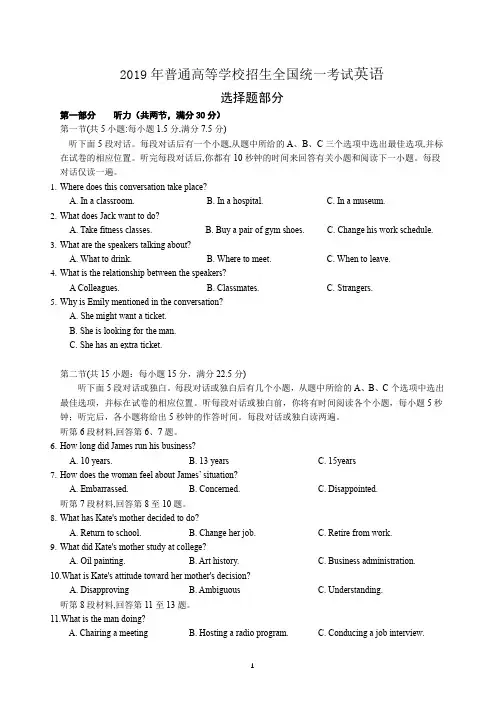
2019年普通高等学校招生全国统一考试英语选择题部分第一部分听力(共两节,满分30分)第一节(共5小题:每小题1.5分,满分7.5分)听下面5段对话。
每段对话后有一个小题,从题中所给的A、B、C三个选项中选出最佳选项,并标在试卷的相应位置。
听完每段对话后,你都有10秒钟的时间来回答有关小题和阅读下一小题。
每段对话仅读一遍。
1.Where does this conversation take place?A. In a classroom.B. In a hospital.C. In a museum.2.What does Jack want to do?A. Take fitness classes.B. Buy a pair of gym shoes.C. Change his work schedule.3.What are the speakers talking about?A. What to drink.B. Where to meet.C. When to leave.4.What is the relationship between the speakers?A Colleagues. B. Classmates. C. Strangers.5.Why is Emily mentioned in the conversation?A. She might want a ticket.B. She is looking for the man.C. She has an extra ticket.第二节(共15小题:每小题15分,满分22.5分)听下面5段对话或独白。
每段对话或独白后有几个小题,从题中所给的A、B、C个选项中选出最佳选项,并标在试卷的相应位置。
听每段对话或独白前,你将有时间阅读各个小题,每小题5秒钟;听完后,各小题将给出5秒钟的作答时间。
每段对话或独白读两遍。
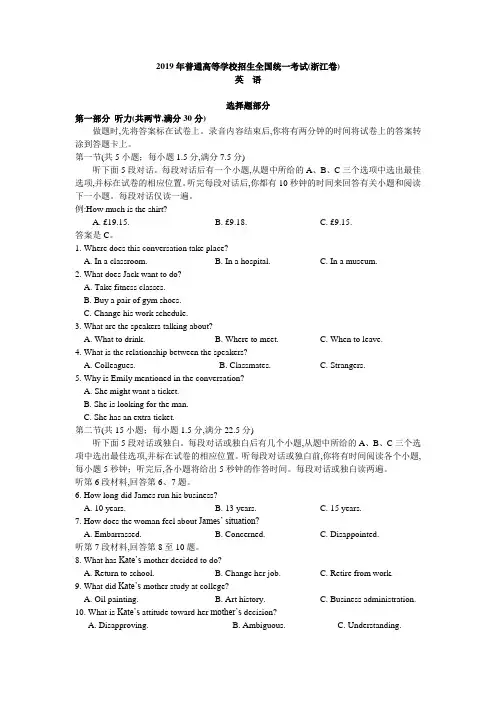
2019年普通高等学校招生全国统一考试(浙江卷)英语选择题部分第一部分听力(共两节,满分30分)做题时,先将答案标在试卷上。
录音内容结束后,你将有两分钟的时间将试卷上的答案转涂到答题卡上。
第一节(共5小题;每小题1.5分,满分7.5分)听下面5段对话。
每段对话后有一个小题,从题中所给的A、B、C三个选项中选出最佳选项,并标在试卷的相应位置。
听完每段对话后,你都有10秒钟的时间来回答有关小题和阅读下一小题。
每段对话仅读一遍。
例:How much is the shirt?A. £19.15.B. £9.18.C. £9.15.答案是C。
1. Where does this conversation take place?A. In a classroom.B. In a hospital.C. In a museum.2. What does Jack want to do?A. Take fitness classes.B. Buy a pair of gym shoes.C. Change his work schedule.3. What are the speakers talking about?A. What to drink.B. Where to meet.C. When to leave.4. What is the relationship between the speakers?A. Colleagues.B. Classmates.C. Strangers.5. Why is Emily mentioned in the conversation?A. She might want a ticket.B. She is looking for the man.C. She has an extra ticket.第二节(共15小题;每小题1.5分,满分22.5分)听下面5段对话或独白。
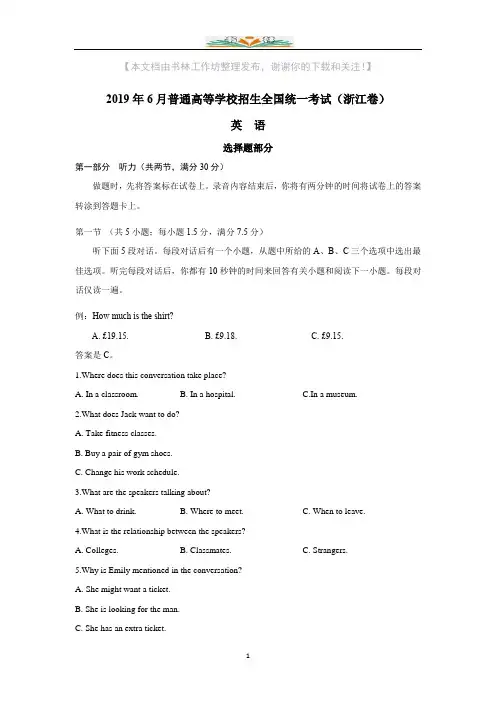
【本文档由书林工作坊整理发布,谢谢你的下载和关注!】2019年6月普通高等学校招生全国统一考试(浙江卷)英语选择题部分第一部分听力(共两节,满分30分)做题时,先将答案标在试卷上。
录音内容结束后,你将有两分钟的时间将试卷上的答案转涂到答题卡上。
第一节(共5小题;每小题1.5分,满分7.5分)听下面5段对话。
每段对话后有一个小题,从题中所给的A、B、C三个选项中选出最佳选项。
听完每段对话后,你都有10秒钟的时间来回答有关小题和阅读下一小题。
每段对话仅读一遍。
例:How much is the shirt?A. £19.15.B. £9.18.C. £9.15.答案是C。
1.Where does this conversation take place?A. In a classroom.B. In a hospital.C.In a museum.2.What does Jack want to do?A. Take fitness classes.B. Buy a pair of gym shoes.C. Change his work schedule.3.What are the speakers talking about?A. What to drink.B. Where to meet.C. When to leave.4.What is the relationship between the speakers?A. Colleges.B. Classmates.C. Strangers.5.Why is Emily mentioned in the conversation?A. She might want a ticket.B. She is looking for the man.C. She has an extra ticket.第二节(共15小题,每小题1.5分,满分22.5分)听下面5段对话或独白。
2019年浙江高三下学期高考模拟英语试卷(浙江省名校新高考联盟(Z20)第三次联考)-学生用卷一、阅读理解(本大题共10小题,每小题2.5分,共25分)1、【来源】 2019年浙江高三下学期高考模拟(A篇)第21~24题10分Several years ago, my mother spent about two weeks in a Montreal hospital following an operation. She was well on the road to recovery and she was wholly determined to return home as soon as possible—then something changed. What followed was as confusing to me as it was to her. She forgot what day it was or who had just visited her. She lost her appetite and her motivation to do the exercises that were helping her heal.I turned to doctors in search of answers, but no one could explain these changes. It wasn't until I came across Sydney Loney's essay "State of Confusion" that I finally found a disease that seemed to fit: hospital-acquired delirium(HAD 医院获得性精神错乱).Every year, thousands of patients leave Canadian hospitals with HAD. The causes of the condition aren't fully understood but are believed to be partly because of poor nutrition, disturbed sleep and the use of some devices which can cause injury. It can happen to anyone, anywhere. There's the 87-year- old woman who broke her hip and then forgot why she was in the hospital; another elderly woman who started seeing waterfalls coming from the ceiling after being admitted.HAD was first identified in the 1960s, but symptoms in today's patients are still mistaken for everyday signs of aging. HAD may look like dementia(痴呆), but it is a serious confused state, while dementia is a condition characterized by memory loss. Most importantly, HAD is usually caused by something related to the outside of one's body—which means it could, in theory, be prevented.…I hope my mother's story provides guidance for readers who have experienced similar situations, and that its knowledge helps protect patients during their hospital stays.(1) When did the author know what disease her mother got?A. After reading a relevant article.B. After consulting doctors.C. After asking other patients for advice.D. After seeking medical service.(2) The two examples in paragraph 3 are used to prove that.A. the aged are the major victims of HADB. people with HAD have different symptomsC. HAD is common among patients admitted to hospitalsD. women in hospital are more likely to suffer from HAD(3) We can know from the text that HAD is a disease.A. which first appeared in the 1960sB. whose cause is still not known for sureC. whose symptoms are the same as those of dementiaD. which has something to do with people's inner body(4) What will the author most probably discuss in the missing part following paragraph 4?A. Infection of HAD.B. Causes of HAD.C. Characteristics of HAD.D. Prevention of HAD.2、【来源】 2019年浙江高三下学期高考模拟(B篇)第25~27题7.5分In the US TV series Friends, Rachel Green is a classic example of a pushover. More often than not, she gives in to her childhood friend Monica Geller's demands on trivial(琐碎的) things such as what to eat for a lunch, even if she has her own preference.Like Rachel, some people find themselves being constantly influenced by others. There are all kinds of reasons why they would act as easy- going and flexible as Rachel does. Maybe the topic of discussion just isn't something that interests them. Take household issues for example. Most men don't get overly excited at the idea of buying new kitchenware. So it's not uncommon to hear a husband tell his wife "you can buy whatever you like"or "I don't care". Technically, he's being a pushover. But he's also being flexible, avoiding any future conflict.Have you ever been traveling with friends and disagreed with them about which scenic spots you should visit? Maybe you had your own opinions on where to go, but you just said, "Oh, I'm fine if we don't go there. It's your call." Being easy-going is certainly a virtue that helps sustain good relationships and makes you a person that others want to be around. It can make you look like a pushover to others, but if you're OK with that, then it's fine. There's nothing wrong with it.But if you hate being thought of as a pushover, then maybe it's time you should learn to say "no". No is a simple yet powerful word. You don't have to do or participate in anything that you don't want to. It won't upset the people around you half as much as you fear it will, and if it does then they will get over it in time. Taking a firm stand clearly defines your likes and dislikes, which can also be an endearing(讨人喜欢的) character trait.(1) What is a pushover likely to do when going to the cinema with a friend?A. Hesitate about which film to see.B. Choose to see the film her friend likes.C. Quarrel with her friend about what to see.D. Persuade her friend to see her favorite film.(2) What does the underlined word "It" in Paragraph4refer to?A. Doing anything friends ask you to do.B. Hating being considered as a pushover.C. Saying "no" to something you don't want.D. Being easy- going to the people around you.(3) What's the author's attitude towards being a pushover?A. Neutral.B. Disapproving.C. Favorable.D. Reserved.3、【来源】 2019年浙江高三下学期高考模拟(C篇)第28~30题7.5分In 1971, an American computer scientist named Evelyn Berezin changed office life forever When she launched the first word processor(处理器). The machine was about the size of a fridge, and so basic that it didn't even have a screen, but it allowed text to be edited and reprinted and so freed millions of secretaries and copy typists from the headache problem of having to retype entire documents due to small errors. They were delighted by the new ease with which they could do their jobs; and soon, the word processor was widely used in offices. Berezin was astonished by this development, which she admitted she had not foreseen.Born in 1925, the daughter of immigrant parents from Russia, Evelyn Berezin grew up in the Bronx. She excelled at school, and studied physics at New York University. In 1951, she joined the Electronic Computer Corporation, becoming the only woman in its team of engineers. Later, she designed computers that did office accounts. In the late 1960s, she began to work on the word processor. By then, IBM had launched a machine that used a magnetic(有磁性的) tape drive to record key strokes(击打键盘), but Berezin's was more advanced since it used semiconductor(半导体) chips. Following the launch of what she called the Data Secretary, orders flooded in and her company, Redactron, grew from having nine employees to 500. Later models had monitors and larger memories. But other tech firms were coming up fast behind, and in the 1980s, the likes of IBM and Wang took off in the market. By that time, she had sold Redactron to the Burroughs Corporation.Sadly, Evelyn Berezin passed away on December 8th, 2018. While her role in the digital revolution has not been much recognized, the Data Secretary is on display at the Computer History Museum in Mountain View, California.(1) What do we know about Berezin's word processor when first launched?A. It freed secretaries from the work of typing documents.B. Its success was within Berezin's expectation.C. It already had monitors and large memories.D. It was technically superior to the one launched by IBM.(2) What does the display of the Data Secretary at the museum show?A. Its unique design and appearance.B. Its wide application in modern offices.C. Its important role in computer history.D. Its strong impact on the future development of computer.(3) What's the best title for the text?A. A Female Computer Pioneer.B. The Data Secretary.C. Innovation in Computer Science.D. Revolution in Word Processor.二、七选五(本大题共5小题,每小题2分,共10分)31~35题10分However young or old you are, writing can be so rewarding. For some writers, it's a fun hobby and a creative task; for others, it's a dream career. When you're just getting started, you might feel excited but also a little unconfident.1Try lots of different types of writing. As a beginner, you're in a great position to try out lots of different types of writing, without needing to commit to one in particular: no one is demanding your next book.2You might surprise yourself with what you enjoy.3If you've never written much before, launching straight into a novel probably won't work. Perhaps you'll run out of steam within a few chapters. It's better to develop your skills on something smaller first. Think about short stories if you're a fiction- writer, or short articles or blog posts if you're a non- fiction writer.Write regularly so you don't lose motivation. Some writers think you should write every day. Personally, I don't think that's very good advice. Maybe your weekdays are very busy, but your weekends are clear.4So it's advisable to set a writing schedule that suits you and your life, but do make sure you're allowing yourself time to write on a regular basis.Use clear, straightforward words. As a writer, it's normally best to keep things simple. You should use the word that best fits what you mean. Sometimes a precise, technical word is the best choice, even if it isn't the simplest, but in general, keep George Orwell's advice in mind: "5" and "Never use a foreign phrase or a scientific word if you can think of an everyday English equivalent (对应词). "A. Always use the simplest word.B. So have a go at a wide range of styles.C. Or perhaps it's the other way round.D. You'd better read various kinds of writing first.E. Start with small projects not book-length works.F. Never use a long word where a short one will do.G. The following tips should help you in your early years as a writer.三、完形填空(本大题共20小题,每小题1.5分,共30分)36~55题30分Through a combination of bad decisions and bad luck, my husband Moth andI1the farmhouse that was our home and our2of income—we used to3it to holidaymakers to earn some money. But the misfortunes didn't4. Around the same time, Moth was diagnosed with a rare brain disease, CBD. The doctor told him that5usually comes six to eight years after the onset(发作) and that he had6had the disease for about six years, which7he had at most two years left. The terrible situation madeus8.Then with a tent9on eBay, a couple of10, thin sleeping bags and the remaining £115 in cash, we11from Minehead and began our journey walking along the West Coast Path. On the way I beganto12 a book about our walk after becoming homeless for Moth. It was a gift to him: a big fat love letter and maybe a reminder for when his13began to fade.I had never dreamt I would14homelessness. People in urban doorways, with addictions or mental problems, is the15perception(看法) of homelessness. But it is not the whole picture. They could be in work, but becausetheir16are temporary, or seasonal, or very low-waged, theyaren't17to landlords(房东).As well as changing how I thought of homelessness, I began to18home differently during the journey. I had thought of home as the19around me, and when I lost that, it felt as though I had lost everything. But as we were walking I startedto20that home is a state of mind: it's what makes you feel safe and you don't need walls for that.A. builtB. lostC. repairedD. paintedA. sourceB. formC. resourceD. rateA. donateB. leaveC. sendD. rentA. lastB. stopC. comeD. changeA. treatmentB. recoveryC. deathD. woundA. probablyB. luckilyC. constantlyD. merelyA. arguedB. confirmedC. meantD. supposedA. relievedB. desperateC. contentD. impatientA. lentB. savedC. putD. boughtA. cheapB. beautifulC. uselessD. fancyA. got overB. came aboutC. carried onD. set offA. readB. writeC. enjoyD. keepA. dreamB. sightC. memoryD. passionA. bring upB. end upC. take upD. make upA. interestingB. strangeC. generalD. pleasantA. jobsB. belongingsC. housesD. conditionsA. accessibleB. friendlyC. acceptableD. gratefulA. returnB. missC. rushD. viewA. wallsB. roofsC. doorsD. windowsA. expectB. realizeC. imagineD. demand四、语法填空(本大题共10小题,每小题1.5分,共15分)6、【来源】 2019年浙江高三下学期高考模拟(浙江省名校新高考联盟(Z20)第三次联考)第56~65题15分The Peppa Pig cartoon follows the life of a pig, Peppa, and her family as they go about their day- to- day life in a fictional U.K. town1(make)up of various animal families. Since the show first aired, there2(be)a total of 241 episodes(集)created as the show enjoyed increasing3(popular).Peppa's very British accent is now apparently having a strongeffect4children from all over the world. Parents in the US are claiming the popular children's TV show Peppa Pig has caused their kids5(start)speaking in a British accent.According to experts, though, American kids may have picked up a Britishism ortwo,6the claim that they're developing a whole accent based on a cartoon, is not7(entire)true. Typically, children develop the accent of the communityaround them. However, it's possible that kids learn to mimic individual words from the show, especially in cases8the child doesn't know the word.So while some American kids9(say)a few words or phrases in British English now, it's quite10(likely)that they would be acquiring an entire second dialect from just watching a TV show.五、应用文写作(本大题共1小题,共15分)7、【来源】 2019年浙江高三下学期高考模拟(浙江省名校新高考联盟(Z20)第三次联考)第66题15分2019年浙江嘉兴高三二模第46题15分假如你是某国际学校的学生李华,在刚结束的中学生英语演讲比赛中获得了第一名。
绝密★启用前2019年6月普通高等学校招生全国统一考试(浙江卷)英语选择题部分第一部分听力(共两节,满分30分)做题时,先将答案标在试卷上。
录音内容结束后,你将有两分钟的时间将试卷上的答案转涂到答题纸上。
第一节(共5小题;每小题1.5分,满分7.5分)听下面5段对话。
每段对话后有一个小题,从题中所给的A、B、C三个选项中选出最佳选项。
听完每段对话后,你都有10秒钟的时间来回答有关小题和阅读下一小题。
每段对话仅读一遍。
例:How much is the shirt?A. £19.15.B. £9.18.C. £9.15.答案是C。
1. Where does this conversation take place?A. In a classroom.B. In a hospital.C. In a museum.2. What does Jack want to do?A. Take fitness classes.B. Buy a pair of gym shoes.C. Change his work schedule.3. What are the speakers talking about?A. What to drink.B. Where to meet.C. When to leave.4. What is the relationship between the speakers?A. Colleagues.B. Classmates.C. Strangers.5. Why is Emily mentioned in the conversation?A. She might want a ticket.B. She is looking for the man.C. She has an extra ticket.第二节(共15小题;每小题1.5分,满分22.5分)听下面5段对话或独白。
绝密★启用前2019年6月普通高等学校招生全国统一考试(浙江卷)英语选择题部分第一部分听力(共两节,满分30分)做题时,先将答案标在试卷上。
录音内容结束后,你将有两分钟的时间将试卷上的答案转涂到答题纸上。
第一部分听力(共两节,满分30分)做题时,先将答案标在试卷上。
录音内容结束后,你将有两分钟的时间将试卷上的答案转涂到答题卡上。
第一节(共5小题;每小题1.5分,满分7.5分)听下面5段对话。
每段对话后有一个小题,从题中所给的A、B、C三个选项中选出最佳选项。
听完每段对话后,你都有10秒钟的时间来回答有关小题和阅读下一小题。
每段对话仅读一遍。
例:How much is the shirt?A. £19.15.B. £9.18.C. £9.15.答案是C。
1.Where does this conversation take place?A. In a classroom.B. In a hospital.C.In a museum.2.What does Jack want to do?A. Take fitness classes.B. Buy a pair of gym shoes.C. Change his work schedule.3.What are the speakers talking about?A. What to drink.B. Where to meet.C. When to leave.4.What is the relationship between the speakers?A. Colleges.B. Classmates.C. Strangers.5.Why is Emily mentioned in the conversation?A. She might want a ticket.B. She is looking for the man.C. She has an extra ticket.第二节(共15小题,每小题1.5分,满分22.5分)听下面5段对话或独白。
绝密★启用前2019年6月普通高等学校招生全国统一考试(浙江卷)英语选择题部分第一部分听力(共两节,满分30分)做题时,先将答案标在试卷上。
录音内容结束后,你将有两分钟的时间将试卷上的答案转涂到答题纸上。
第一节(共5小题;每小题1.5分,满分7.5分)听下面5段对话。
每段对话后有一个小题,从题中所给的A、B、C三个选项中选出最佳选项。
听完每段对话后,你都有10秒钟的时间来回答有关小题和阅读下一小题。
每段对话仅读一遍。
例:How much is the shirt?A. £19.15.B. £9.18.C. £9.15.答案是C。
1. Where does this conversation take place?A. In a classroom.B. In a hospital.C. In a museum.2. What does Jack want to do?A. Take fitness classes.B. Buy a pair of gym shoes.C. Change his work schedule.3. What are the speakers talking about?A. What to drink.B. Where to meet.C. When to leave.4. What is the relationship between the speakers?A. Colleagues.B. Classmates.C. Strangers.5. Why is Emily mentioned in the conversation?A. She might want a ticket.B. She is looking for the man.C. She has an extra ticket.第二节(共15小题;每小题1.5分,满分22.5分)听下面5段对话或独白。
绝密★启用前2019年6月普通高等学校招生全国统一考试(浙江卷)英语选择题部分第一部分听力(共两节,满分30分)做题时,先将答案标在试卷上。
录音内容结束后,你将有两分钟的时间将试卷上的答案转涂到答题纸上。
第一部分听力(共两节,满分30分)做题时,先将答案标在试卷上。
录音内容结束后,你将有两分钟的时间将试卷上的答案转涂到答题卡上。
第一节(共5小题;每小题1.5分,满分7.5分)听下面5段对话。
每段对话后有一个小题,从题中所给的A、B、C三个选项中选出最佳选项。
听完每段对话后,你都有10秒钟的时间来回答有关小题和阅读下一小题。
每段对话仅读一遍。
例:How much is the shirt?A. £19.15.B. £9.18.C. £9.15.答案是C。
1.Where does this conversation take place?A. In a classroom.B. In a hospital.C.In a museum.2.What does Jack want to do?A. Take fitness classes.B. Buy a pair of gym shoes.C. Change his work schedule.3.What are the speakers talking about?A. What to drink.B. Where to meet.C. When to leave.4.What is the relationship between the speakers?A. Colleges.B. Classmates.C. Strangers.5.Why is Emily mentioned in the conversation?A. She might want a ticket.B. She is looking for the man.C. She has an extra ticket.第二节(共15小题,每小题1.5分,满分22.5分)听下面5段对话或独白。
浙江省2020届高三下学期高考模拟英语试题1.本试题卷分第Ⅰ卷(选择题)和第Ⅱ卷(非选择题),共6 页,满分150 分,考试时间120 分钟。
2.答题前,在答题纸指定区域填写班级、姓名、考场号、座位号及准考证号。
3.所有答案必须写在答题纸上,写在试卷上无效。
4.考试结束后,只需上交答题纸。
第Ⅰ卷第一部分:听力(共两节,满分30 分)做题时,先将答案标在试卷上。
录音内容结朿后,你将有两分钟的时间将试卷上的答案转涂到答题纸上。
第一节(共 5 小题;每小题1.5 分,满分7.5 分) 听下面 5 段对话。
每段对话后有一个小题,从题中所给的 A、B、C 三个选项中选出最佳选项,并标在试卷的相应位置。
听完每段对话后,你都有 10 秒钟的时间来回答有关小题和阅读下一小题。
每段对话仅读一遍。
1.What does the man want to do?A. Get to a place.B. Buy a map.C. Give an address.2.What does the woman think of her experience of the party?A. Wonderful.B. Awful.C. Just so-so.3.What kind of fruit is cheap in the woman’s country?A. Apple.B. Orange.C. Pear.4.What will the woman do during the spring vacation?A. Go to Japan.B. Have the wedding anniversary.C. Visit her grandparents.5.When will the two speakers probably discuss the project?A. On Tuesday.B. On Thursday.C. On Friday.第二节(共15 小题;每小题 1.5 分,满分22.5 分) 听下面 5 段对话或独白。
2019-2020 学年高三下学期6月冲刺英语试卷(新高考卷)(浙江版)(试卷满分150分,考试时间120分钟)注意事项:1.答卷前,考生务必将自己的姓名、准考证号填写在答题卡上。
2.回答选择题时,选出每小题答案后,用铅笔把答题卡上对应题目的答案标号涂黑。
如需改动,用橡皮擦干净后,再选涂其他答案标号。
回答非选择题时,将答案写在答题卡上,写在本试卷上无效。
3.考试结束后,将本试卷和答题卡一并交回。
第一部分听力(共两节,满分30分)做题时,先将答案标在试卷上。
录音内容结束后,你将有两分钟的时间将试卷上的答案转涂到答题卡上。
第一节(共5小题;每小题1.5分,满分7.5分)听下面5段对话。
每段对话后有一个小题,从题中所给的A、B、C三个选项中选出最佳选项,并标在试卷的相应位置。
听完每段对话后,你都有10秒钟的时间来回答有关小题和阅读下一小题。
每段对话仅读一遍。
1. What do we know about John?A. He had an accident.B. He works in the hospital.C. He suffered from a headache.2. Why is the man late?A. He overslept.B. He lost his car key.C. He had no alarm clocks.3. What are the speakers mainly talking about?A. Health.B. Education.C. Environment.4. How old is the girl?A. 6 years old.B. 9 years old.C. 15 years old.5. What’s the relationship between the speakers?A. Neighbors.B. Former classmates.C. Workmates.第二节(共15小题;每小题1.5分,满分22.5分)听下面5段对话或独白。
每段对话或独白后有几个小题,从题中所给的A、B、C三个选项中选出最佳选项,并标在试卷的相应位置。
听每段对话或独白前,你将有时间阅读各个小题,每小题5秒钟;听完后,各小题将给出5秒钟的作答时间。
每段对话或独白读两遍。
听下面一段对话,回答第6和第7两个小题。
6. Who needs a new dress?A. Jenny.B. Ann.C. Lucy.7. Where will the speakers go first?A. A clothes store.B. The City Library.C. A bookstore.听下面一段对话,回答第8至第10三个小题。
8. What is the party for?A. A festival.B. A birthday.C. An anniversary.9. Why does the girl talk to the man?A. To ask for permission.B. To make an invitation.C. To get some advice.10. What will the headmaster do before the party?A. Sing an English song.B. Share his resolutions.C. Deliver a speech.听下面一段对话,回答第11至第13三个小题。
11. What did the m an think of the girl’s last paper?A. Excellent.B. Ordinary.C. Poorly done.12. Who helped the girl with her research?A. Jean.B. Mr. Smith.C. Ms. White.13. What will the girl do next?A. Rewrite the paper.B. Ask for sick leave.C. Prepare for an oral presentation.听下面一段对话,回答第14至第17四个小题。
14. What does the woman want to do?A. Get fit.B. Kill time.C. Relax herself.15. When can non-members enjoy the special offer?A. This month.B. During holidays.C. On their birthdays.16. How much does a swimming class cost non-members each time?A. $35.B. $25.C. $10.17. What class will the woman choose?A. A weight lifting class.B. A swimming class.C. A yoga class.听下面一段独白,回答第18至第20三个小题。
18. Why did the reader feel lonely?A. She had trouble with her studies.B. Her best friend wasn’t around.C. She was unable to look after herself.19. What is the speaker trying to do?A. Introduce a class.B. Share experiences.C. Give suggestions.20. Whom is this passage written for?A. Teachers.B. Parents.C. Students.第二部分阅读理解(共两节,满分35分)第一节(共10小题;每小题2.5分,满分25分)阅读下列短文,从每题所给的A、B、C和D四个选项中,选出最佳选项,并在答题纸上将该项涂黑。
AUminur Kuchukova of Russia could have retired years ago. Yet the 61-year-old teacher keeps working at a school in the Siberian village of Sibilyakovo. She continues to teach for one reason: the school’s one and only student, a nine-year-old boy. Kuchukova is to leave next year for health problems, which means the school will close.Sibilyakovo is like thousands of villages across Russia: Many people moved out of it after the closure of the local state-operated collective farm. Sibilyakovo is mainly home to Tatars, a Turkic group that is one of many minorities in Russia. In the 1970s, the village had a population of 550 and a primary school with four classes. Each class had about 18 children. Today the village’s population has shrunk to 39.Kuchukova has taught at the school for 42 years. She has bought a home in the town of Tara, about 50 kilometers away and plans to retire there with her husband at the end of the school year. By then, she hopes, her only student will be old enough to travel to a neighboring village for classes. But the nearest school is a 30-minute boat ride across the Irtysh River followed by a 20-minute ride on a school bus.Kuchukova does not think her student, Ravil, is ready yet for making such a trip every school d ay. “His parents don’t want to leave Sibilyakovo yet and it’s scary to send a little boy like him over the Irtysh. There are such big waves,” she says.And even when she herself will finally retire and go to live in Tara, Kuchukova will not leave her past behind, saying, “My parents are buried here; a part of me is here.”21. How does Kuchukova feel when it comes to Ravil?A. Worried.B. Hopeful.C. Proud.D. Guilty.22. Which of the following best describes Kuchukova as a teacher?A. Responsible and caring.B. Careful and positive.C. Patient and determined.D. Selfless and confident.23. What does the last paragraph convey?A. Kuchukova’s love for Tara.B. Kuchukova’s pla n for future.C. Kuchukova’s memory of her parents.D. Kuchukova’s bond with the village.BMarket traders and street vendors (小贩) are making a comeback across China, and this time they find themselves equipped with a new set of digital skills essential to directing the vast consumer market. To make mom-and-pop retail stands active, the country’s leading e-commerce platforms are lending a helping hand, offering a series of services from inventory support to accessible financing backed by technologies to finally promote domestic (国内的) spending and employment.Domestic wholesale site is among the first group of tech players with such offerings. At the heart of the action plan is an effort to link street vendors directly with factories, effectively avoiding middlemen and saving time and costs. “The large number of small-scale merchants on the site has managed to gain the upper hand in price negotiations, while manufacturers are more willing to mass-produce goods as the economy of scale serves to reduce costs, thus creating a win-win situation,” general manager Wang Hai said. On the financial front, 1688’s parent Alibaba Group i s offering interest-free loans worth a total of 70 billion yuan ($9.8 billion), with which qualified merchants can purchase goods in quantity. Risk assessment for each applicant is conducted by sister service Mybank.Meanwhile, e-commerce giant has promised to secure quality goods worth more than 50 billion yuan and is offering each stall keeper up to 100,000 yuan worth of interest-free loans for the purpose of filling their inventory. To stabilize employment, JD decided to add a number of job positions that either require flexible working hours, allow working from home or are designed to promote start-up businesses. For posts related to logistics, delivery, warehouse management and packaging, people from poverty-stricken areas should be employed first.“The novel coronavirus outbreak will accelerate the digital transformation of the real economy, and individual traders and smaller stores are no exception,” said Xu Lei, CEO of JD’s retail unit. “We have the ability and, more important, the responsibility to inject vitality (活力) into these entities, thus contributing to the economic rebound and stabilizing employment.”24. According to Wang Hai, ’s action plan may be an example of __________.A. barking up the wrong treeB. putting the cart before the horseC. robbing Peter to pay PaulD. killing two birds with one stone25. What do we know about JD’s plan to create more posts?A. It covers various job selections.B. It aims at expanding their business.C. Employees will have to work regularly.D. Employees in poor areas will get funds.26. What is Xu Lei’s attitude towards the development of economy?A. Disappointed.B. Confident.C. Doubtful.D. Uncaring.CNo man is an island. But for the coronavirus patients in hospitals, they die alone —physically separated from the friends and family who love them. This cruel reality weighs heavily on a group of New York City volunteers whose mission is to actually connect patients with family members unable to be present due to hospital restrictions on visitors. Their solution: to collect used iPads from across the country and donate them to hospitals in underserved (缺医少药的) communities where the need is most serious.“It’s a heartbreaking scene,” Nicolas Heller, a 31-year-old documentarian, said of the thousands of people who have died from the disease in isolation, without the comforting words ortouch from a loved one. “A lot of these people are dying prematurely, whether they had medical issues or not. It’s crushing.” said Heller, who is part of iPads to Hospitals, an organization —founded by two medical students, Amy Johnson and Jeff Arace — that is collecting used iPads for patients who do not own smartphones capable of video chatting. The group explained how the donated iPads could also benefit hospital staff with limited personal protective equipment, such as masks and gloves. The tablet computers can allow medical staff to communicate with patients from outside of the room, decreasing their risk of exposure to the virus.As of Friday morning, the group said it has received 375 used iPads from donors nationwide and raised more than $22,000 through its GoFundMe page to purchase more devices. So far, 50 of the iPads have been donated to Brooklyn’s COVID-only site, University Hospital of Brooklyn at SUNY Downstate, whose staff expressed the critical impact the devices can have on patients and also health care workers.“The lifeblood of what we’re doing is making use of people’s iPads that are in their drawers and on their desks that they don’t use anymore,” said Ian Kaplan, a film director from Brooklyn. “I’ve had every make and model of iPad ever made in my hands in the last week,” said 29-year-old Kaplan. “With the exception of the first model, which doesn’t have a camera, we can make use of any iPad. However, we are nowhere near meeting the demand of every hospital that we speak with.”27. Why do volunteers collect used iPads?A. To make better use of iPads.B. To collect and sell them to patients.C. To enable patients to contact with their family.D. To equip underserved communities.28. What can we know according to Paragraph 2?A. Heller is one of iPads to Hospitals’s founders.B. Hospital staff can use iPads to contact with their family.C. These iPads can be beneficial to medical workers.D. These iPads can protect hospital staff from the virus.29. What can we infer from the statement of Ian Kaplan?A. People donated iPads because they wanted to buy new ones.B. Every make and model of iPad can be used in hospitals.C. Those iPads in his hands are all with cameras.D. There is still a lot of iPads needed to meet the demand.30. What is the main idea of this passage?A. Patients in hospitals are physically separated.B. Group collects used iPads to connect patients with family.C. How was iPads to Hospitals founded by two medical students.D. How to collect iPads for hospitals.第二节(共5小题;每小题2分,满分10分)根据短文内容,从短文后的选项中选出能填入空白处的最佳选项。